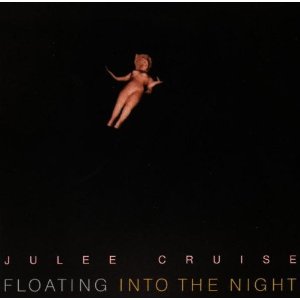I loved Twin Peaks. I loved it so much. It was just exactly right for a pretentious teenage boy and I picked up everything I could that was related to it. I think I've still got the impossibly arousing Radio Times article and cover. Anyway, the point is that I also bought, as well as the soundtrack, the Julee Cruise album that was associated to the show, Floating Into the Night (1989). I had forgotten just what a wonderful record it is, dark, moody but achingly beautiful and full of a cryptic mystery. Cruise's faint vocals are charming and Angelo Badalamenti's music is simultaneously creepily old-fashioned and strangely modern. It's a languid trip through a musical version of Lynch's psychological abstraction and it's really, really lovely.

Were CSS really cool, or were they just a bit shit? I think I thought they were cool back in 2006, now I have absolutely no idea. Listening to CSS (2006) for the first time in a while I'm struck by how casual and clear and confident it sounds, but also by how thin the songs are. Does it matter? Is it all about attitude? God knows. It's still good fun and Lovefoxxx will also be cool no matter what (even despite going out with a bloke from the Klaxons), but I'm not totally convinced that the album's mash-up of late disco, fake-rap, proto DHR noise and too-cool-for school stance was really that great. Sure, they had the titles ('Meeting Paris Hilton', 'Let's Make Love and Listen to Death from Above', 'Art Bitch') and some of the tunes are fantastic ('Off the Hook' and album closer 'This Month, Day 10' for instance) but I don't know if there's anything really going on after all. Pretty much everybody agreed that after the fun and scrappy tunes of CSS, follow-up Donkey (2008) is a let-down. Everybody, as usual, is wrong though. Donkey is a much better album, and it's partly down to the fact that it's massively polished production-wise in comparison, and where that would normally kill an interesting band, it actually smooths out some of the kinks and proves that CSS can write some great, fully-fledged songs. It does all sound a bit mature and it's true that some of the quirks that made CSS interesting have gone in the process but it's nice to hear them actually play chunky post-new wave songs that have some real substance. It's a game of two halves, the first being some seriously solid rock numbers, the second being much more synth-led, but they're all great. Not shit after all.


Ah, the wonderful Cub. Now this is how you play cutesy punk-pop. Lo-fi, super-scrappy and charming as all get out. Cub were just fantastic, great peppy songs, spirited delivery and just pure unadultered fun. Absolutely brilliant. Largely forgotten now, it would surprise many to learn that Neko Case's first foray into the indie-rock world was as Cub's first drummer. However, by the time the split single with the Potatomen was released in 1995 she had moved on to start researching her country career. 'The Day I Said Goodbye' is prototypical Cub, jaunty, sassy, knockabout and completely transfixing. Indeed, everything they made follows the same formula and their second album, Come Out Come Out (1995) is chock full of 2 minute punk-pop gems that fizz and buzz along with buckets of energy and charm to spare. It's hardly worth singling out any songs but we may as well mention that of the classics on Come Out Come Out we have 'Everything's Geometry', 'Tomorrow Go Away', 'Voracious' and the mighty 'My Flaming Red Bobsled'.
Third and final Cub album, Box of Hair (1996) is again more of the same, but this time they had a bit more time to put the record together and it has a more leisurely pace (as in, less frantic) and the cutesy melodies are given room to breathe and brings out just how great they are. There are even overdubs (!), meaning we get some nice 60's handclaps and even a muted accordion on super-cute 'Magic 8 Ball', and a lovely violin part on 'Riverside'. Of all the Cub records it's probably the least immediately fun or accessible but it is probably the best in terms of the songwriting and performance. In any event, it hardly matters, they're all great.
The Cult were (are, incredibly) one of the most laughably absurd bands, like, ever, but I ask you, is it possible not to love 'She Sells Sanctuary'? Surely it isn't possible. It's one of the flat-out greatest massive dumb rock songs ever written, with a riff to die for, an attitude of leather-trouser wearing idiocy that puts all others to shame and a truly lunatic self-confidence. It's simply a fantastic song. 7" B-side, 'No.13' isn't.

Finally before the weekend, let's dig some super-gloom courtesy of the Cure's second album Seventeen Seconds (1980). While Seventeen Seconds is for the most part a hit-free zone ('A Forest' is the only successful single and the one even vaguely spritely moment on the album), it does have a distinct subtle grace. It's glacial for sure, and for some stretches simply rather dull, but there's a clear vision to it and Robert Smith clearly used it as a way of speeding up the process of defining a sound (he wrote it in two days, recorded it in three and spent about 3 grand on it). It's main flaw, besides steadfastly maintaining a frigid pace, is in the cheap recording, because whereas the Cocteau Twins used a drum machine as a key part of their diverse sound, on Seventeen Seconds it just plods away, alternately thudding and cracking, far too high in the mix, and it contributes largely to an unnecessarily tedious feel to the album. It's a shame, because underneath the pedestrain pace is a record of burgeoning discomfort and spooky outsiderishness which is quite compelling.
No comments:
Post a Comment